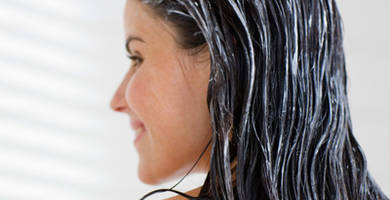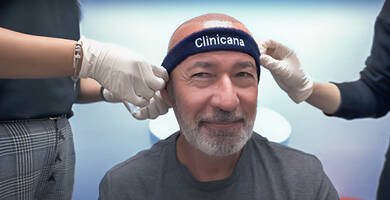Dandruff and hair loss
By Prof. Dr. Soner Tatlidede 2019-07-12

Dandruff and hair loss are usually seen as one being the cause of the other. In other words, many people wonder “Does dandruff cause hair loss?” Well, it depends on many factors, so let´s take a more detailed look at this problem, its causes, its symptoms, its treatment, and if dandruff can cause hair loss or not.
If you have hair loss problems due to this or another condition, remember that after the proper treatment for your illness a possible solution to recover the lost hair and your original look is a FUE hair transplant at our clinic in Istanbul, Turkey.
Causes of dandruff
Dandruff is a harmless and chronic condition, it happens when the head scalp becomes dry or oily; as a result white flakes of dead skin will accumulate in your hair or even on your shoulders.
Even if not being harmful, dandruff problem can be embarrassing for some people. Dandruff normally starts between ages of 10 and 20 years; also, it affects up to 40 % of people with ages around 30 years old. Hair loss from dandruff is not something common, but it’s possible especially in the worst cases or if combined with other diseases or hair problems.
Shedding of dead skin cells is an ordinary action because the skin cells in the head scalp are created in a continuously way. However, skin cells with dandruff are shed faster than normal. Also, if there is oil in the head scalp it will cause the skin cells to combine with each other, and look like white flakes.
Dandruff can be caused by several reasons such as dry skin, sensitivity to hair products, and skin problems such as psoriasis, seborrheic dermatitis or eczema. Overgrowth of yeast on the skin can also cause dandruff. There are many reasons behind this overgrowth; for instance, it could be as a result of hormones or suffering from stress; also, it may happen because of too much oil in the head scalp and some problems in the immune system.
Symptoms and complications
The signs of dandruff include white flakes of dead skin in the hair or even on the shoulders, and you will have itchy crusty scalp, too. Dandruff spreads over the scalp in general.
If the cause of dandruff is seborrheic dermatitis, the symptoms are usually gradual. The head scalp becomes dry or oily; skin cells turn into yellowish scales when they die. Seborrheic dermatitis could also have symptoms in different parts of the human body. The reddish scaling can be shown in different places for example, on the hairline or on the nose and chest; it may also appear around ears.
Besides this, scaling due to psoriasis is seen in the form of silver-colored flakes in the ear, extremities, trunk, palms and soles.
Diagnosis of dandruff
Dandruff is a simple condition that a person can identify himself/herself with symptoms such as itchiness, dryness and crusting.
Seborrheic dermatitis manifests with redness, yellowish dandruff and mild itching. Psoriasis is usually silvery, flaky, and in contrast to Seborrhoeic dermatitis, it is well-defined by its plaques. A doctor or dermatologist can easily distinguish sebaceous skin of psoriasis from the appearance of the skin.
Treatment and precautions
Dandruff may be a chronic condition, but in the same time it can be controlled by a suitable and adequate treatment. First shampoo your hair with a chemical-free shampoo, apply a firm massage to the scalp and then rinse your hair. Another way to get rid of the flakes is by shampooing repeatedly and this will decrease the oiliness and prevent the dead skin to build up on the head scalp.
If this method is not beneficial, special anti-dandruff shampoos usually work. Instructions for use vary according to the shampoo used. Some are used daily, others only once or twice a week. When choosing a non-prescribed shampoo, make sure it includes anti-dandruff ingredients such as ketoconazole, selenium sulphide, salicylic acid, sulfur, coal tar or zinc pyrite. However, an anti dandruff shampoo can´t prevent hair loss if your problem is serious.
There are many products that can remove these flakes, you should just try different types of them and see which one is good for your scalp and give you excellent results. Ketoconazole-containing shampoos seem to be more effective when compared to other non-prescribed shampoos used in seborrheic dermatitis and dandruff treatment.
If you do not see any benefit after 2 weeks of using over-the-counter products, or if the situation worsens, you might consider seeing a doctor. A doctor can write you down a corticosteroid lotion to use it and apply it on your scalp. Do not use corticosteroid-containing products for long periods without doctor’s advice. These products may scratch the skin structure and cause other side effects.
Use of shampoos for babies
The use of corticosteroid shampoos and lotions for babies is not appropriate, as babies’ skin absorb products easier than adults’ skin. Seborrhoeic dermatitis in infants usually disappears spontaneously a year after birth, without any treatment.
Another good effect of using a dandruff shampoo for washing your head scalp is that after this treatment the hair will start to grow again. Shampoo your hair frequently to clean the head, reduce your stress level, try to reduce the use of hair products (jellies and sprays), and get a healthy eating habit: these are useful hints to avoid dandruff.
Hair loss medications and dandruff
Using hair loss medication such as Minoxidil to treat thinning hair can have other effects on the head scalp, like causing dandruff flaking as a side effect. Alcohol in Minoxidil can help in drying out your head scalp, so after a few months of treatment dandruff may set in.
In most cases, you can solve this problem by replacing the drug you are using with another drug, or using a dandruff shampoo or a prescription steroid cream, if the condition is too bad. Finasteride, another drug used in hair loss, does not lead to dandruff.
In summary, we can characterize dandruff as a cosmetic discomfort, but it is not a serious and contagious disease and does not cause other health problems. However, if it is not treated, itching and inflammation may occur, causing hair loss. So, dandruff and hair loss can be related but only in the worst cases. In any case, your best option is to get the professional assessment of a doctor, who will make a diagnosis and will seek the best treatment for your problem.









